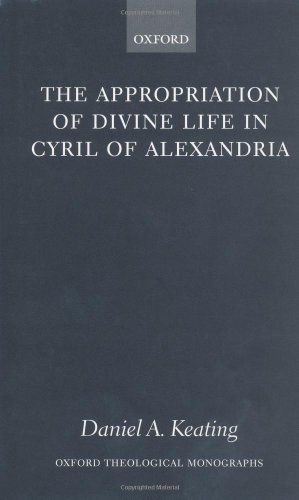

Most ebook files are in PDF format, so you can easily read them using various software such as Foxit Reader or directly on the Google Chrome browser.
Some ebook files are released by publishers in other formats such as .awz, .mobi, .epub, .fb2, etc. You may need to install specific software to read these formats on mobile/PC, such as Calibre.
Please read the tutorial at this link: https://ebookbell.com/faq
We offer FREE conversion to the popular formats you request; however, this may take some time. Therefore, right after payment, please email us, and we will try to provide the service as quickly as possible.
For some exceptional file formats or broken links (if any), please refrain from opening any disputes. Instead, email us first, and we will try to assist within a maximum of 6 hours.
EbookBell Team

4.7
56 reviews
ISBN 10: 0199267138
ISBN 13: 9780199267132
Author: Daniel A Keating
Introduction
1.1 The Problem of Divine Life in Christ: An Introduction to Christology
1.2 Cyril of Alexandria: Historical Context and Theological Significance
1.3 The Scope and Method of This Study
1.4 A Note on Terminology: 'Appropriation,' 'Enhypostasis,' and 'Union'
1.5 Thesis Statement: How Cyril's Christology Explains the Human's Participation in Divine Life
Chapter 1: The Theological and Philosophical Background
2.1 The Patristic Tradition before Cyril
2.1.1 The Cappadocian Fathers on Divine and Human Natures
2.1.2 Athanasius of Alexandria and the Doctrine of Deification (theōsis)
2.1.3 The Christological Controversies Pre-Cyril (Apollinarianism, etc.)
2.2 The Neoplatonic Concept of Participation
2.2.1 The One, the Nous, and the Soul
2.2.2 Porphyry and the Ladder of Being
2.2.3 The Influence of Neoplatonism on Alexandrian Theology
2.3 The Diodoran and Antiochene Christology
2.3.1 Diodore of Tarsus and Theodore of Mopsuestia
2.3.2 The Doctrine of the Synapheia (Conjunction)
2.3.3 The Problem of Separation of Natures
Chapter 2: The Core of Cyril's Christology: The Hypostatic Union
3.1 The Meaning of Hypostasis in Cyril's Thought
3.2 The Formula of "One Nature of the Incarnate Word" (mia physis tou Theou Logou sesarkomenē)
3.2.1 The Origin and Misunderstanding of the Formula
3.2.2 Reconciling Unity and Distinction of Natures
3.3 The Concept of Enhypostasis: The Human Nature's Existence "in" the Logos
3.4 Critiquing Nestorius: The Problem with the "Two Sons"
3.5 The "Communication of Idioms" (communicatio idiomatum): Explaining the Divine and Human Predicates
Chapter 3: The Incarnation as the Conduit of Divine Life
4.1 The Body of Christ as a "Life-Giving" Body
4.1.1 The Logos's Indwelling and its Effect on the Human Nature
4.1.2 The Body of Christ as the Temple of the Holy Spirit
4.2 The Role of the Eucharist: The "Life-Giving Flesh"
4.2.1 Cyril's Soteriological Reading of John 6
4.2.2 The Eucharist as a Means of Participating in Christ's Immortal Flesh
4.3 The Work of the Holy Spirit in the Incarnation and in the Believer
4.3.1 The Spirit as the Agent of Union and Sanctification
4.3.2 The Spirit's Presence in Christ and in the Church
Chapter 4: The Soteriological Implications: Deification (Theōsis)
5.1 Cyril's Doctrine of Salvation
5.2 The Restoration of the Human Nature in Christ
5.2.1 Overcoming Corruption and Death through the Incarnation
5.2.2 The "New Adam" and the Recapitulation of Humanity
5.3 The Human's Participation in Divine Life: A Matter of Grace, not Nature
5.3.1 Distinction between the Union in Christ and the Union of the Believer
5.3.2 The Role of Faith and Baptism in Receiving this Life
5.4 Comparison with Other Patristic Views of Theōsis (e.g., Athanasius, the Cappadocians)
Chapter 5: The Appropriation of Divine Life in Action
6.1 Ethical Implications: The New Way of Life in Christ
6.2 The Christian Life as a Process of Divinization
6.3 The Church as the Body of Christ: A Communal Appropriation of Divine Life
6.4 Ecclesiology and the Sacraments as Instruments of Grace
Conclusion: Cyril's Legacy and Relevance
7.1 Summary of Cyril's Christological and Soteriological Contribution
7.2 The Reception of Cyril at the Council of Chalcedon
7.3 Cyril's Enduring Influence on Orthodox and Catholic Theology
7.4 Contemporary Significance: Relevance for Systematic Theology and Spiritual Life
the appropriation of divine life in cyril
the appropriation of divine life in cyril of alexandria
divine appropriation
the appropriation of cultures characters
cyprian on the lapsed
Tags: Daniel A Keating, Appropriation, Divine